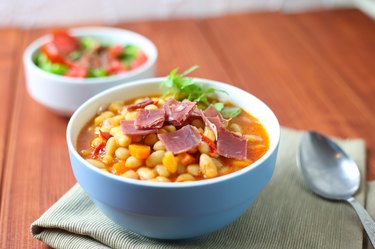
Beans are high in protein, iron, fiber and other nutrients -- and low in fat, cholesterol and sodium. In addition, beans are inexpensive, delicious in a variety of dishes and an excellent substitute for meat. Eating beans may have some drawbacks, however, including gastrointestinal problems.
Gastrointestinal Problems
Video of the Day
The high amount of nondigestible fiber in beans may cause gastrointestinal problems if you aren't used to eating them. Reduce intestinal discomfort by changing the water several times while soaking beans. In addition, drink plenty of fluids and get regular physical activity to help your body move your bowels. Gradually adding beans to your diet can also help you avoid unpleasant intestinal effects. If you still experience gas, abdominal cramping or other symptoms after eating beans, consider sprinkling an over-the-counter digestive enzyme on the beans before eating them.
Video of the Day
Iron Absorption
Many types of beans contain high levels of iron, such as kidney beans, lima beans, soybeans and white beans. However, beans provide non-heme iron, which isn't as easy to absorb as heme, or meat sources of iron. Improve your absorption of iron by eating beans along with meat, seafood or poultry or by eating beans with a source of vitamin C, such as oranges or bell peppers, recommends the Centers for Disease Control and Prevention.
Incomplete Protein
Beans don't contain complete proteins, which means they don't provide all the essential amino acids your body needs. Eat other protein-rich legumes and grains, such as rice, to ensure you consume all of the essential amino acids. You don't have to eat other proteins at the same meal as beans as long as you eat them on the same day, says the CDC.
Preparation Time
Most beans have to be soaked before cooking. If you don't plan ahead, having to soak beans can be frustrating. However, don't skip this step -- soaking beans helps dissolve the starches that cause gastrointestinal problems. Most types of beans double or triple in size as they absorb water through soaking. If you forget to soak the beans overnight, boil them for two to three minutes and then let them sit, covered, for an hour at room temperature before draining, rinsing and cooking.